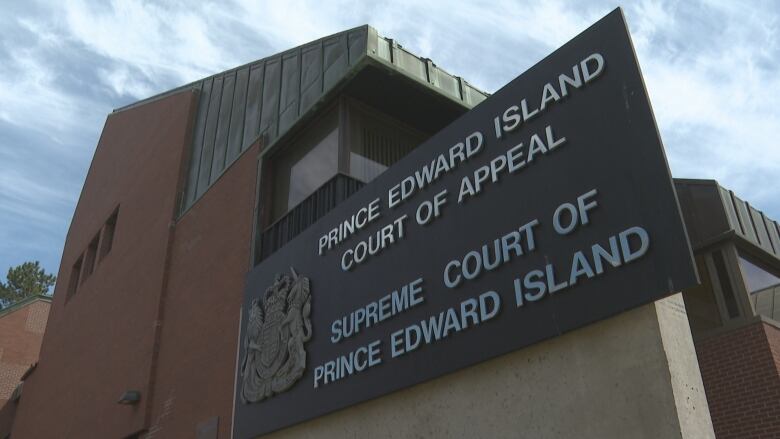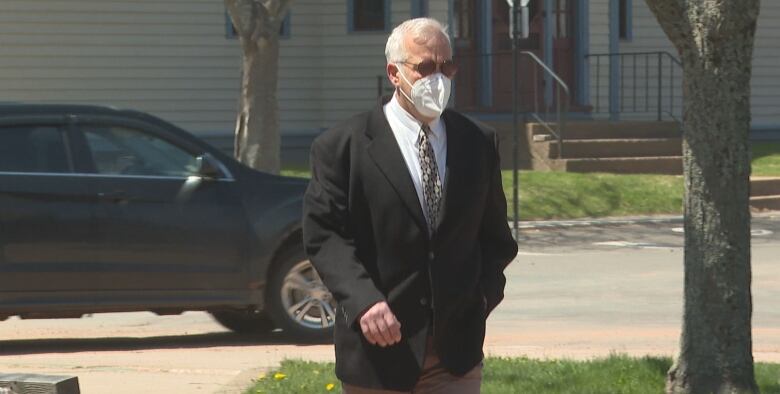Defence lawyer in P.E.I. sex assault trial focuses on woman's medical records
Lawyer for Edward Mundle asked why complainant didn't tell doctors about alleged assault

Warning: Some readers may find details in this story to be disturbing or triggering.
The lawyer defending a man accused of sexual assault wants to know why the complainant never mentioned the alleged assault to doctors who treated her for a serious bacterial infectionin 2014.
Lawyer Peter Ghiz is defending Edward Thomas Mundle, 58, of Charlottetown.
Ghiz was cross-examining Stephanie Douglas on Wednesday in P.E.I. Supreme Court. Douglas testified she had been hospitalized for weeks following the alleged sexual assault on New Year's Day, 2014.
"This was the most horrific thing you experienced in your whole life and you didn't disclose it to your doctors?" asked Ghiz.
Douglas was hospitalized for sepsis about 10 days after the alleged assault with a sex toy, which she said Tuesday caused "excruciating" pain.
Ghiz cited medical records that show Douglas told doctors she believed sexual activity she'd had with a man was the source of the infection, but did not say she'd been assaulted.

Douglas testified the omission was understandable.
"Rape is a very difficult thing for women to process. It takes time when someone you've been seeing has hurt you," said Douglas.
Jury hearing case
A jury of eight men and four women is hearing the case, with Chief Justice Tracey Clements presiding.
Court has heard Douglas and Mundle met on a dating website and had been involved in a consensual sexual relationship involving dominant and submissive role playing.
Douglas has testified Mundle disregarded their pre-arranged safe word and sexually assaulted her on the day in question.

As the defence began presenting its evidence Wednesday, Ghiz told the jury this case never should have come to court.
"The police investigation was flawed," Ghiz told the jury. "Police ignored psychiatric evidence and forensic evidence."
She is prone to hallucinations and delusions ... The assault as alleged by Ms. Douglas did not happen.- Peter Ghiz
Ghiz, citing medical records, told the jury that Douglas has mental health issues dating back decades and a family history of mental illness.
Ghiz also cited a statement Douglas provided to police that she was in a "messed up" stateandhad not been taking her psychiatric medication as prescribed at the time of the alleged incident.
"She is prone to hallucinations and delusions," Ghiz told the jury. "The assault as alleged by Ms. Douglas did not happen."
N.S. expert questions timeline
Because of pandemic-related travel restrictions, a medical expert testified by video link from Halifax as the defence began presenting its case.
Dr. Todd Hatchette,the service chief for microbiology in the central zone of Nova Scotia's health authority, said the timeline does not add up for an alleged assault on Jan. 1 to lead to the kind of illness Douglas suffered.
If Douglas's statements about the assault leading to her illness were true, she would have become ill with sepsis far more quickly than she did, Hatchette testified within 24 to 48 hours, not a week or more.
He said the sepsis was most likely related to a urinary tract infection.
Hatchette also testified that the medical records he reviewed from Douglas's hospital stay did not mention any sign of injury to the pelvic area.
Questions on lack of publication ban
Douglas has not requested a publication ban on her name, the usual practice in Canadian sexual assault trials, designed to shield the privacy of alleged victims.
During cross-examination of her testimony, Ghiz wanted to know why.
"You wanted the world to know? You knew the media would carry the story line?" asked Ghiz.
"It's important, especially for Black and Indigenous women, not to have a publication ban, so other young women who are facing these situations might feel more comfortable and confident in coming forward," said Douglas.
"It's not just about me."
The trial continues Thursday.












_(720p).jpg)


 OFFICIAL HD MUSIC VIDEO.jpg)
.jpg)



























































































